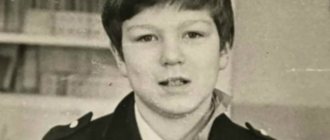Biography of Alexander Nevzorov
Alexander Glebovich Nevzorov - director, publicist, video blogger and hippologist scientist, former reporter and TV presenter of the famous Leningrad TV program of the late 80s “600 seconds”, included in the Guinness Book of Records as the world's most rated television project, participant in military conflicts , State Duma deputy of the first four convocations.
A novice in a monastery during the Soviet era, Nevzorov later became known as the author of harsh statements about religion, a critic of the Kremlin’s policies in Crimea and the Donbass. He is recognized as a model nonconformist, opposing the prevailing norms of law and order.
Alexander Glebovich Nevzorov
Having changed many areas of activity, Nevzorov invariably achieved very significant success in each. He considers horses to be his true calling, being one of the most famous hippologists in the Russian Federation, the author of hundreds of articles and books devoted to the history, anatomy, physiology and psychology of these noble animals.
Alexander Nevzorov: A person needs to know that he is a dangerous creature
Alexander Nevzorov, the one from “600 Seconds” and the author of “The Horse Encyclopedia” and “A Brief History of Cynicism,” now devotes all his time to neuroanatomy. As a result, membership in the Russian scientific community of anatomists, histologists and embryologists. In St. Petersburg, the exhibition “The Human Body: The Dead Teach the Living,” curated by Nevzorov, was incredibly popular throughout the season. Now he is writing a book about the origin of intelligence and filming a project for Channel One. “Not about horses,” warns Alexander Glebovich. In a word, Nevzorov is extremely busy, so we met in fits and starts, between castings for a television project. Our first meeting took place on July 8th. This determined the beginning of the conversation...
"Einstein called the Bible a collection of primitive legends"
Nevzorov:
Does anything bother you about this holiday? Day of love, family and fidelity?
RG:
No, what is it, Alexander Glebovich?
Nevzorov:
Do you know the story of Saints Peter and Fevronia? He was seriously ill, she agreed to treat him only on the condition “marry me.” He underwent treatment, treatment and... refused. And she, a cunning girl, under-treated him a little. And he returned to her. So, through blackmail, she became his wife. This forced and, apparently, childless marriage lasted for some time. Then they are tonsured as monks and thereby divorced. When tonsure occurs, all connections with the earthly are severed. Nevertheless, he, dying, sends messengers to her demanding that she die on the same day as him. And then something amazing happens - they die, they are placed in different coffins in different places. But somehow they end up in the same coffin - a pure nightmare on Elm Street. And this happens twice. Agree, a very dubious story.
RG:
In your interpretation it sounds appropriate. But for some reason they were still chosen as the patrons of family happiness, marital love and fidelity?
Nevzorov:
That’s why they chose Prince Alexander Nevsky as a symbol of Russia, who, in order to calmly travel to the Horde and kiss the khan’s boots, “protected” us from European enlightenment. Although it should be noted that Alexander Nevsky was canonized not by the church, but by the Jewish director Sergei Eisenstein in his film.
RG:
Why did you emphasize Eisenstein's nationality?
Nevzorov:
Because that’s exactly what he was and he didn’t hide it. I emphasized this because Jewry is a painful issue in Russia. All other nationalities are not perceived so sharply. By the way, please do not consider me an anti-Semite. For me, as an anatomist, the question of nationality does not exist at all. The anatomical structure of humans is very variable. The sizes of the spleens, liver, the length of the vagus nerve can vary, the size of the brain can vary catastrophically globally, etc. - and all within the same nationality. This whole division into nationalities is absolute nonsense, especially since there are no purebred Russians or purebreds of anyone else - we are not the result of selection, like some Irish setter.
We must understand that all this - nationalities, “special paths”, literature, faith - are just intraspecific games of primates that lead to strictly instinctive things. To dominance, to the opportunity to use females, the best food, the best cave.
RG:
What about conscience? Is it at the level of instinct?
Nevzorov:
Nothing more than a cultural myth. It is important to understand the real scale of these games. And that, as soon as we are gone as a species, the Earth will breathe a sigh of colossal relief, and no one will feel sorry for us.
RG:
And there is no meaning in our existence?
The division into nationalities is absolute nonsense; there are no purebred Russians or purebred anyone else
Nevzorov:
Absolutely. Evolution is a dispassionate thing. It is much more correct and courageous to recognize one’s place in this world, to come to terms with the fact that man is just an evolved animal, and one that has recently evolved, as Charles Darwin, Sir Alfred Wallace, Thomas Henry Huxley and all the other evolutionists once explained to us. And the more sober, the more careful we will treat ourselves.
RG:
Paradox.
Nevzorov:
Yes, because a person needs to know that he is a dangerous creature. That there are no supernatural or otherworldly influences on him. Knowing the truth about ourselves - that a person is a very dangerous, conflict-ridden, extremely cruel creature, we agreed on a certain standard of behavior. Anyone who violates the convention is subject to punishment. Everything is very simple.
RG:
Perhaps man is just a recently evolved animal, with all the ensuing consequences. But, excuse me, I’m closer to Einstein’s “Life is sacred; it is, so to speak, the supreme value to which all other values are subordinated.” And, by the way, doesn’t it bother you that the great physicist did not deny the metaphysics of the world?
Nevzorov:
Einstein called the Bible a collection of childishly primitive legends.
RG:
Bible - yes. But he believed in Spinoza's God - a God who manifests himself in the ordered harmony of existence, and not in a God who is concerned with human destinies and actions.
Nevzorov:
I have never seen any metaphysics in the human body. And, to be honest, I don’t really understand the function, role and purpose of the soul. I guess it's just a funny myth. As for Einstein, what you are talking about is a certain, let’s say, honest conclusion from insufficient knowledge of the Universe. Because faith is simply the absence of knowledge and nothing more. Einstein was an infinitely honest and brilliant physicist, cosmologist, a man who knew how to calculate and formulate the laws of the origin and existence of the Universe, but he, as we know, was not always right.
Thank God, in science it is possible and even necessary to make mistakes, since even mistakes are of great value. Wolfgang Pauli was once asked if he thought that one article was wrong. He replied that this definition was too soft - the article was not even wrong. Likewise, Einstein’s mistakes are brilliant mistakes. And he didn't have enough knowledge. It is not enough for Stephen Hawking, nor for Erwin Schrödinger. If we look at Newton, we will be convinced that, yes, he was a religious man, although he professed Arianism (according to which Christ is the divine mediator between God and man, subordinate to God the Father who created him), cursed by the Christian church. What he did not understand about the world order, he replaced with the hypothesis of God. In other words, where there is a lack of knowledge, faith is formed. And this is natural. If you had no idea what kerosene was and suddenly saw burning water, you would begin to believe in something supernatural. But today it is becoming more and more difficult to remain ignorant.
RG:
You are talking about lack of knowledge. But you also cannot speak unequivocally about the absence of metaphysics. As Professor Philip Johnson, one of the most respected critics of the theory of evolution, has observed, there is no conclusive experimental evidence that evolution was not directed by some divine plan.
Nevzorov:
Unfortunately, I have not seen a single authoritative testimony about any event that has metaphysics at its core.
RG:
As Susan Sontag said, we are surrounded by “vague piety.” And it’s no coincidence... Is it worth depriving us of any meaning and support?
Nevzorov:
If you want to see the secret, please. Believe in love, in conscience, in patriotism, which is considered something like sexual-geographical attraction, but in fact it is a contract that is concluded with a place convenient for you. Believe in Artemis, in Jesus, in whomever you want. I absolutely don’t want to disturb you in this or dissuade you from anything. I understand perfectly well that people value their illusions very much. After all, stereotypes exist not only because they are convenient, but also because they are loved. But I can only note one thing: scientifically, you will not be convinced of the presence of any metaphysics.
RG:
Aren't you yourself afraid of living in a desert of meaninglessness?
Nevzorov:
I explained my position. No, I’m not afraid, because I absolutely trust the scientific point of view, which has already been thoroughly developed by the 21st century. And I see no reason to look for other hypotheses to explain life. The God hypothesis has the right to exist just like any other. But it is so weak, so purely declarative, that it should not be taken seriously.
RG:
And yet, about metaphysics - British scientists have established that a person is born with faith in God, that the child’s way of thinking includes an intuitive belief in the supernatural.
Nevzorov:
The names of these scientists? A person comes into the world after 9 months of gestation, having the level of a spinal animal. With a complete absence of any knowledge, ideas about the world, with very limited sensory perception. He is just beginning to perceive the sound world. As for preception, the feeling of oneself, yes, it exists, but what is our consciousness? This is the sum of external sensations.
RG:
But isn’t it possible to attribute man’s innate sense of beauty to metaphysics?
Nevzorov:
The idea of aesthetics, as you know, varies depending on era and geography. It is clear that you and I perceive beauty differently than the inhabitants of the 7th century. This is variability that is not fixed evolutionarily, neurophysiologically.
RG:
Fine. Ancient people, in fact, had one task - survival, procreation. But archaeological discoveries of the mid-20th century prove that they were characterized by aesthetic feelings.
Nevzorov:
In a completely insignificant form. Aesthetics is for very well-fed people living in an established society with certain preferences.
RG:
But wait - do you really need to be well-fed to go to the river bank and experience a feeling of shock from the splendor of the landscape? Do such beauty ever take your breath away?
Nevzorov:
Not really. Go to the park opposite, find a spider there and look at how, in principle, its shape is functional and not bad from a design point of view. But the main thing here is that design is absolutely inseparable from morphology. Because if the spider had three fewer legs, or had an eye in its butt instead of the eight in its head, you probably wouldn't admire such a perfect design. He would be illogical. I celebrate this design and this aesthetic only ever as a consequence of natural evolutionary perfection. Everything about us is explained solely by physiology. And in the case of the river view too.
“You don’t need to fool yourself with all sorts of nonsense about the public good”
RG:
It’s not worth asking about your attitude towards euthanasia.
Nevzorov:
I have a normal attitude towards euthanasia. A person has every right to manage his life. And you don’t have to die in a bed with wires, but choose a much more beautiful way. A person has the right to commit suicide. Every woman has the right to do whatever she wants with her fetus. A person is not the property of the state.
RG:
Even if he is no one’s property, you cannot be self-centered and forget about your loved ones. When a teenager passes away, what should his mother do?
Nevzorov:
Yes, he has the right to make this choice, but he is also responsible for it. This choice was probably dictated by unconsciousness, dictated in turn by a small amount of knowledge. The task of parents is to provide as much knowledge as possible so that this choice is not made. But you are trying to dramatize everything, trying to comprehend it from a social point of view. But you just have to accept that there is a person, there is his choice. And I believe that every person should have enough mental strength to survive this tragedy. Remember the Spartan mothers.
RG:
We found an example - Sparta! What's good about a story about a boy whose insides were eaten by a fox?
Nevzorov:
It wasn't pointless. Because it was an example of excellent parenting and a stunning contribution to human civilization. Perhaps more valuable than Homer, Hesiod or the effeminate men of Athens. If you remember the wonderful words that when I write what I want and say what I want, there is a piece of the contribution of the Spartan king Leonidas, who above all valued limitless human personal freedom and the ability to oppose oneself to any dictate.
I am against the idea of some kind of religious doctrine being again implanted in a country that I care about.
RG:
And where are they, your Spartans?
Nevzorov:
In each of us. And we can talk to you about this topic thanks to them too.
RG:
They did not exist for very long, which means they did not undergo natural selection.
Nevzorov:
Sparta existed for 400 years, and during this time they did their job. Their contribution to the cultural evolution of humanity was precisely to perish. The most powerful, undeniable proof a person can present is the ability to sacrifice life.
RG:
Alexander Glebovich, you are talking about intraspecific games, but at the same time you are quite actively involved in social life.
Nevzorov:
Where am I actively participating? I don't participate at all. I was invited to a program on NTV, don’t be lazy, call the editor and find out how much they tried to persuade me.
RG:
But you didn't refuse.
Nevzorov:
Because they have leverage over me. Or they just defeat me with tediousness. But I don’t go anywhere, I don’t run with my views and I don’t offer them. They ask me - I answer. And this is a huge difference.
RG:
They could have refused. Remember how the Roman Emperor Diocletian gave up power and spent the rest of his days growing cabbage.
Nevzorov:
And he brushed aside all offers to return. Believe me, I also brush off most offers, and there are many.
RG:
And wouldn’t you really like to return to TV, say, as the host of conflict programs like “Gordon Quixote” or “To the Barrier”?
Nevzorov:
I'm not interested in doing television. Why do I need all this, strictly speaking, today, when I once walked through and conquered this entire television space? There is no longer a wild forest where you can exterminate savages, there are no battles - smoke, arable land, tractors are everywhere. People live their own lives. As a professional conqueror, I have nothing to do there.
RG:
So, today, a young ambitious journalist has nowhere to turn around on television?
Nevzorov:
No, of course, there is somewhere to turn around. You just need to have a reserve of cruelty, cynicism, unscrupulousness, courage, a willingness to take risks and the ability to lose. But first of all, don’t fool yourself with all sorts of nonsense about the public good.
RG:
You don't want to return to television and refuse all offers. But you actively oppose the Orthodox Church. Your opinion that the church should not own property was fiercely debated by the public. Why do you need this fight?
Nevzorov:
Because it was necessary to break the blockade.
RG:
Blockade?
Nevzorov:
Yes, because there was a blockade when one could only speak complimentarily about the church.
RG:
But why do you need this fuss? The next “intraspecific games”?
Nevzorov:
I don't like blockades. Again, I am not doing this in an intrusive way or suggesting that anyone should break through this blockade. They just ask me, but I won’t double-deal and dissemble. I'm not at war with anyone. Understand that I have nothing against faith as such. I have nothing against Jesus Christ or Christianity. I'm like Christ, like a flying spaghetti monster...
RG:
Religious skeptics also have a parody symbol - the “invisible pink unicorn”...
Nevzorov:
There is also some kind of gaseous vertebrate. So for me they are all equal figures. I am only against the idea that some kind of religious doctrine is again being implanted in a country that I care about; I am against the emergence of Orthodox medicine. How is it different from conventional medicine? I am against the church not being taxed. Why does one pay taxes and the other not, but at the same time uses roads, healthcare, and so on? Why is there a certain profession that exempts its representatives from paying taxes? This categorically does not suit me. As soon as the church takes its rightful place under the Constitution, any claims will immediately disappear.
RG:
But there was a period when you yourself wanted to become a monk.
Nevzorov:
Firstly, this was in my very early youth. Secondly, in many ways it was born in me as a protest. Most of all, I hated all kinds of manifestations of collectivity, and I had a desire to isolate myself and not take part in the life of society. And finally, you never know what happened before. There is such a thing as personal evolution. It is completely inevitable, since there are books, events, people that change a person. If he stopped at some stage, he is more likely to be worthy of a certain kind of pity, rather than admiration.
RG:
You have finally found a place where you can fight again...
Nevzorov:
No, I’m not fighting against anyone at all. I'm just showing my sides. And it’s no coincidence - after all, with my reputation, all the issues have been resolved long ago. It is enough to thoroughly spoil it once to live in absolute freedom. To understand how much I don’t care about my reputation, you need to live my life, have the same number of revealing, cursing, condemning publications as there were at the time of “600 seconds.” After all this, such cheerful indifference is developed. The only thing that confuses me a little is that when they bully me, they always go through dirty facts from twenty years ago. I’m offended - in my biography there are much more nightmarish, from the point of view of public opinion, and much more picturesque facts from different eras of my life. I’m even thinking about organizing something like an auction and selling a few particularly disgusting facts from my biography at a higher price?
RG:
And where is the money?
Nevzorov:
To me, of course.
RG:
What about charity?
Nevzorov:
I don't do it. I am not interested.
“Every war led to the triumph of janitors over the intellectual”
RG:
By the way, in one publication I read your remark about the sunken ship “Bulgaria” - they say, since my relatives were not there, I don’t care. Is that really what they said?
Nevzorov:
Yes. And mind you, they asked me, and I answered, and did not climb on someone: “Let me tell you how I feel about the shipwreck.” Indeed, none of my relatives and friends were there - why should I worry?
RG:
What about basic sympathy?
Nevzorov:
Sympathy is possible... But still it has nothing to do with me, and it really doesn’t bother me much.
RG:
You live in this country, you must be in tune with what is happening in it.
Nevzorov:
Why? I didn’t sign up for consonance anywhere. I don't have this responsibility.
RG:
Such distance and egocentrism are fraught with anarchy.
Nevzorov:
But we are already at each other’s throats, defending our territory. But we do this by uttering words that no one needs, and so we will do it silently. It's much cuter, believe me.
In general, you are trying to generalize everything very globally. Firstly, I don’t think that my experience can seem so tempting to anyone that everyone will want to become Alexander Nevzorov. And secondly, for this you still need to live an equally winding, complex, rich biography. Acquire the skills of an ideological gladiator and much more. This is not available to everyone.
In this prosperous 19th century, both you and I could find ourselves as those who are sold on the slave market
And one more thing - in order to live like I do, you need to have serious interests in some narrow specialty or narrow professionalism. In this case, you cannot afford to read news from the Internet, because you have a pile of 28 books on your table that you not only need to read, but also bookmark, send something for photocopying, scan something, etc. d. I am generally not interested in anything that is not directly related to me or my work. For example, I once learned with great surprise that some Laden had been killed. And since he has nothing to do with me, I immediately forgot about him. Or what do I care about some vacationers who were washed away in large numbers in Bali or somewhere else...
RG:
Haven't you heard of Japan either?
Nevzorov:
My mother-in-law told me about this - she is very afraid of nuclear power plants. This is an information drug that everyone is hooked on. But I happily avoid it. And I know many serious, responsible people who live in a natural “vacuum” of their own thoughts, ideas, ideas, knowledge. And they are not interested in all this fuss, like typhoons, nuclear power plants, ships.
RG:
Which for most are in the category of “bread and circuses”?
Nevzorov:
Of course. You can’t talk about news as a source of knowledge. What they tell us from TV screens about the same Fukushima is not knowledge. In order to know the situation, you need to go there, spend 2-3 months there, fully understand the issues of nuclear and radiation safety, technology and production, etc. Study the issue deeply, thoughtfully, so that you have the right to at least open your mouth on this topic.
RG:
In some ways, news is good for keeping the conversation going. Let’s imagine a situation where several people find themselves at the same table, each of whom is focused on something different. How can they find contact?
Nevzorov:
What's the problem? There are always general topics that I talked about with people who understood absolutely nothing about what I was doing at the moment, no matter what it was - horses, brains, Kabbalah or Freemasons. Now a wonderful topic has appeared - children.
RG:
Are you interested in other people's children?
Nevzorov:
Yes. I am interested in comparing development and characters, noting the characteristics of my own child.
RG:
Previously, what topic united so many different people?
Nevzorov:
Ladies. This is a highly universal topic that arouses interest among people of all classes. In addition, it is extremely variable.
RG:
Recently I accidentally overheard a conversation in a cafe between two twenty-year-old people - words like Hiroshima and Auschwitz were a revelation to them. Doesn't this scare you?
Nevzorov:
No, I don’t care at all what certain young people don’t know. My son will know what Hiroshima is, and what Auschwitz is, and everything else.
RG:
But do you realize that, in principle, he will be a “black sheep”?
Nevzorov:
And what? Firstly, it is difficult to speak for what the world will be like in 15-20 years, when he has to face it seriously. But believe me, I’m not going to equate it with the dullness you’re talking about. Again, no need to be dramatic. There was and is a certain gray mass and intellectuals; there has always been a clear line of demarcation between them. Now the gray masses have the opportunity to legalize their culture. And he revels in it. But what's the problem? If you belong to this reference group, do you listen to Kirkorov, and if not, then do you not listen?
RG:
But we are talking about the dominance of the one whom Dmitry Merezhkovsky at the beginning of the last century called “the coming boor,” meaning, of course, not the proletarian, the peasant, but precisely the “murlo petty bourgeois,” in the words of Mayakovsky. The one who crushes his foot on the street and not only does not apologize, but also rejoices.
Nevzorov:
You are based on the 19th century. I assure you, there were centuries when janitors not only crushed women’s legs, but also raped them on the threshold of their own houses, among the slaughtered barmaids.
RG:
This is an extreme situation...
Nevzorov:
You and I can count 169 years of peace in the entire history of mankind. And every war, no matter whether it was religious, territorial or ethnic, led to the triumph of the janitors over any intellectual. The opposite happened, but in rare cases. Don't idealize the past. Do not compare with the relatively prosperous 19th century. At the same time, remember that in this prosperous 19th century, both you and I could find ourselves as those who are sold on the slave market...
So, as Pushkin wonderfully wrote, “Whoever lived and thought, cannot help but despise people in his soul...” This contempt must be initially introduced and explained.
RG:
Are you tuning your son to a certain tuning fork? Meanwhile, he himself must make a choice whether to despise people or not.
Nevzorov:
No, I’m not setting him up, I’m telling him the truth. And then let him choose for himself.
RG:
Imagine a situation: years later, your son comes to you and says: “Dad, I have decided to become a priest.”
Nevzorov:
Okay. Everyone has the right to play the games they want.
RG:
But you put something completely different into it.
Nevzorov:
So what? It's his right.
RG:
And finally. If you look so misanthropically at the “today” of humanity, don’t you have any hopes for its future?
Nevzorov:
Something will change when people stop feeling like sheep, slaves, someone's property. When the authorities will not impose national ideas, try to interfere in personal life.
RG:
And how will our consciousness increase?
Nevzorov:
It increases naturally.
RG:
Yeah, after all, divine evolution...
Nevzorov:
No, this is an external local evolution of that rattle of the brain that we call intelligence. And which is a consequence of progress, the accumulation of knowledge, which inevitably affects everyone.
Childhood and family
Alexander was born on August 3, 1958 in Leningrad. His mother, Galina Georgievna Nevzorova, was a journalist and raised her son alone. Father - Bogomolov Gleb Sergeevich - artist. My maternal grandfather was a state security officer and the head of the anti-banditry service in Lithuania from 1946 to 1955. He graduated from a school with in-depth study of the French language and the Literary Institute. He sang in the church choir and later received theological education at the Moscow Theological Academy. He was expelled from the fourth year of this university of the Russian Orthodox Church due to the traditional nature of his sexual orientation (according to Nevzorov himself).
Personal life[edit | edit wiki text]
The first wife is Natalya Nikolaevna Nevzorova, a researcher at the Manuscript Department of the Russian National Library. From his first marriage he has a daughter, Polina, who is married to actor Sergei Gorobchenko.
The second wife is Alexandra Evgenievna Yakovleva (born 1957) - Soviet and Russian actress.[3]
The third wife is Lydia Nevzorova[3] (born 1973[3]), an artist[3], also a hippologist. In 2007, the couple had a son, Alexander.[3]
Alexander Nevzorov is a vegetarian[50].
Nevzorov’s multifaceted activities: journalism and politics
During his youth, rich in risky adventures, he managed to be a stuntman, a loader, a museum employee, a literary secretary, and a screenwriter.
He became known nationwide in the late 1980s as a television journalist, creator and host of the highly social program “600 Seconds.” The viewer saw the host of the now iconic Leningrad TV program for the first time in the “Vzglyad” program.
In 1990, an attempt was made on Nevzorov. An unknown informant offered him interesting incriminating evidence, and during the meeting he shot Alexander in the heart area. The bullet, fortunately, did not cause significant harm to health - it did not hit the heart.
Nevzorov actively participated in political confrontations and crises in our modern history - in the State Emergency Committee (1991), in shootouts in Latvia in Vecmilgravis, the storming of the Riga Ministry of Internal Affairs building, pogroms of Baltic customs houses. In 1991, the Central Television showed a film from Nevzorov’s series of reports “Ours” about the riot police in Vilnius.
In 1993, he did not stand aside during attempts to forcefully seize a television center in Moscow with a demand for broadcasting and protection from the shooting of the White House. He sheltered fugitive members of the Vilnius and Riga riot police unit “Black Berets” in the Russian Federation.
Nevzorov participated in the wars in Yugoslavia, Transnistria, Iraq, Karabakh, and Chechnya. He received concussion and wounds and was a volunteer hostage of terrorists. He has many awards, in particular, the Order “For Personal Courage”, medals “Defender of Transnistria”, “Participant in Combat Actions in Chechnya”, “For Strengthening the Military Commonwealth”.
Journalist Alexander Nevzorov in his youth
In addition to the film “Ours” about the events in Lithuania, Transnistria, Karabakh, Nevzorov presented the book “Field of Honor” in 1995, and also made films about the Chechen armed conflict - “Hell” (1995) and “Purgatory” (1997). He was a TV presenter of the programs “Days”, “Wild Field”, “Nevzorov”. The showing of the film “Hell” about the storming of Grozny by Russian troops on TV caused negative reviews from the public, who accused the author of bias.
Today he notes that he managed to come off such a powerful ideological drug, which he considers imperial nationalism. The evolution of his views occurred when he realized how dearly this empire was costing people. The Russian idea, according to Nevzorov, is beautifully packaged in words about kindness and spirituality, but always leads to a meaningless gray result and “the need to wrap other people’s guts around the tracks of our tanks.”
Nevzorov was an adviser to the governors of St. Petersburg (Vladimir Yakovlev and Valentina Matvienko), editor-in-chief at St. Petersburg TV, and was elected to the State Duma four times. In the period from 1994 to 1998, he was an analyst for Boris Berezovsky and a consultant to the Russian government.
Alexander Glebovich is an academician of the International Slavic Academy of Sciences, a member of the Union of Journalists of his native city, an adviser to the General Director of Channel One, a full member of the All-Russian Scientific Society of Anatomists, Histologists and Embryologists. Speaks three foreign languages - French, Lakota, Latin.
Who did Alexander Nevzorov turn into?
Nevzorov in the 90s
Political scientist and journalist R. Antonovsky reflects on the degradation of the once popular TV presenter:
That's what's amazing. From what height and to what bottom did Alexander Nevzorov fall?
It’s like two completely different people: Nevzorov of the 90s and Nevzorov of the 21st century.
Few people remember, but this old clown and obscenity was an ardent Orthodox patriot and the coolest gonzo journalist in the 90s. Russian Hunter Thompson.
I remember how, as a child, my whole family watched his program “600 Seconds” every evening.
Against the backdrop of the collapse and decay of the Red Empire, when most journalists joyfully spat at a Russia on its knees, Nevzorov recorded this collapse with contempt, revealing in his program the insides of the dirty, rotten and criminal Petersburg of those years. Disparaging, rather than praising, murderers, thieves, prostitutes and new Russians.
Nevzorov’s broadcasts of those years are a ray of light in the kingdom of media darkness. While entire channels like Gusinsky’s NTV went over to the side of the enemy, relished the murder of Russians and the Russian army, openly supporting Chechen and Arab terrorists in Ichkeria, Nevzorov filmed the brilliant cycle “Ours,” where he heroized the feat of the Russian soldier, be it the Riga and Vilnius riot police, opposing a demoniac crowd of local chauvinists, Russian volunteers in Abkhazia, Serbia, Transnistria and Karabakh, the Russian army in Chechnya.
He himself personally traveled to all these hot spots, without fear of bullets. He conducted dangerous investigations against corruption in St. Petersburg, where bandits shot him at point-blank range.
He was in the White House on the side of Parliament when the Yeltsinists fired at it from tanks and machine guns.
He was on the editorial board of the radical patriotic newspaper Den. He was elected to the Duma from the national-patriotic opposition.
He made two difficult and realistic feature films about the war in Chechnya: “Hell” and “Purgatory”, which infuriated the then liberals with their bright pro-Russian position.
And yes, Nevzorov of those years was an ardent Orthodox believer.
What happened to him today? How did he turn into a bilious, muttering, harmful old man who beats horses and pours slop on Christianity, Russia and his own people?
How did he go from being a cool journalist and publicist to becoming the author of idiotic pseudoscientific books with a bunch of factual errors, where there is nothing but narcissism in the style of another clown - Ponasenkov?
Even look at the photo. Nevzorov of the 90s - a cool, textured, distinctly cisgender man in a leather jacket. The face is straight from the poster of a cool action movie.
And today, who does he look like? Some kind of blue vampire, poorly dressed in parrot coats, with women's trousers on his arms and neck and traces of senile dementia in his eyes.
A toothless vampire klutz who tries to bite you, but only succeeds in smacking your lips and sucking you in with the foul-smelling mouth of an evil old man.
It feels like Nevzorov of the 90s walked under God, and today Nevzorov made a deal not even with the devil, but with a small pot-bellied ironic demon.
But he could have become a phenomenon on the level of Limonov and Mishima. But I chose hell and rock bottom.
Roman ANTONOVSKY
Nevzorov's work with horses
Despite a life full of incredible events, a successful career as a politician and undoubted literary talent, Nevzorov considers his true purpose to be the field of activity associated with horses. His passion for these animals began with equestrian sports and stunts at film studios, and continued with the founding of his own higher school of horse training, Nevzorov Haute Ecole (“Ecole Schools”). At the Nevzorov School they strive to establish a dialogue with the horse and reveal its physical and mental capabilities, based on the principle of working with the animal without the use of coercion. Much attention is paid to the horse’s health, communication, and study of its abilities.
Alexander Nevzorov and horses
Alexander also hosts “Lessons in Atheism” on the Internet, being confident that there is strict Orthodox censorship on television, and the only place left for free discussion about religion is on the Internet.
Personal life of Alexander Nevzorov
Nevzorov is married.
His wife Lydia is a hippologist, writer and editor of school books. The couple has a son, Alexander. Nevzorov and his wife made a revolution in the minds of many people, completely changing the attitude towards horses as a meat product or a means of transport into a true understanding of their exclusivity, the presence of intelligence and kindness. Alexander created a number of films about horses - “The Horse Encyclopedia”, “The Horse Crucified and Resurrected”, “Lectio Equaria Palaestra” and others, as well as books, including “Treatise on School Boarding”, “Equestrian Sports: Secrets of Mastery”.
Nevzorov supports Ukraine’s fight against “the militias of the south-east of the country” and considers the annexation of Crimea to the Russian Federation as “looting”. According to the journalist, the Kremlin and the majority zombied by TV, and not the real Russia of Tsiolkovsky, Dobrolyubov and Pavlov, do not want to recognize the fact that Ukraine is a country with the right to self-determination.
Family and children of Alexander Nevzorov
The family and children of Alexander Nevzorov are also of interest to fans, and not surprisingly - there is something to tell here. The future journalist himself was brought up in a single-parent family - grandmother and mother. Mom, by the way, was a journalist. Her father worked in the MGB and fought against terrorist organizations in Lithuania, which at that time was part of the USSR. Nevzorov says that he has not seen his father, so there is no information about him.
Now, the journalist has two children. However, when he separated from his first wife, he stopped helping his daughter and took almost no part in her upbringing. We will tell you more about children below.











